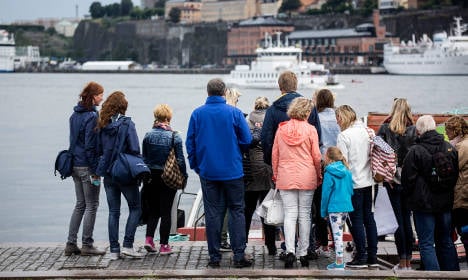Despite warm weather predicted to move in across Sweden this weekend, the wettest May in several decades and a rainier summer than normal have prompted many Swedes to seek out warmer climes.
Almost 3.4 million people travelled to or from one of the ten hubs run by Sweden's state-owned airport operator Swedavia in the month of July. That is an increase by nine percent – or 275,000 travellers in real terms – compared to the same period last year.
“A contributing factor is obviously the bad weather. People have started to go abroad to find some of the much-needed sun after a tough winter season,” press spokeswoman Charlotte Periasamy told Swedish Radio on Friday.
READ ALSO: Tentative promise of summer's return to Sweden
The number of trips abroad soared by ten percent compared to July last year, with around 2.5 million jetting off in search of summer sunshine. In total traffic across Sweden's borders has increased by seven percent in the first seven months of the year.
Friday's figures follow reports from travel companies last month saying that bookings have soared as a result of Swedes' desire to get to warmer regions.
In other high-flying news, low-cost airline Norwegian's passenger numbers soared past those of its Scandinavian competitor SAS for the first time. A total of 2.59 million people travelled with SAS in July compared to 2.69 million Norwegian passengers.
“This is an expression of the fact that the holiday season is more of a top season for the low-cost airlines,” Jacob Pedersen, an analyst for Danish banking giant Sydbank, told Danish newswire Ritzau.
“If we look ahead a month or two SAS will have more passengers yet again,” he added.

Foreign tourists in Stockholm. Photo: Linus Sundahl-Djerf/SvD/TT
Meanwhile, as Swedes were fleeing the country, tourists from abroad came pouring in. Foreign visitors spent a total of 1.6 million nights in hotels across Sweden in June, a rise of 6.2 percent compared to the same month last year, according to Dagens Industri.
“It's going to be another top year,” predicted Björn Arnek, economist at Visita, in an interview with the financial newspaper.
READ ALSO: The Local's ultimate guide to travel in Sweden
Record numbers of foreign tourists were already expected to head to Sweden in their camper vans and mobile homes this summer.
And as of Friday their road trips are set to get a little bit cheaper. In the morning leading petrol companies announced they were cutting the price of a litre of unleaded petrol to 13.94 kronor ($1.59).
Diesel and etanol remained at 12.75 and 10.83 kronor per litre, respectively.
Around 160,000 people worked in Sweden's tourist industry in 2014. Foreign visitors spent around 96 billion kronor in the Nordic country in the same year.



 Please whitelist us to continue reading.
Please whitelist us to continue reading.